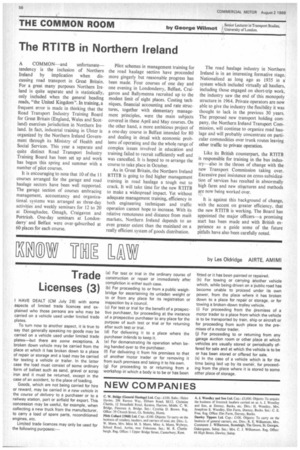The RTITB in Northern Ireland
Page 58

If you've noticed an error in this article please click here to report it so we can fix it.
A COMMON--and unfortunate— tendency is the inclusion of Northern Ireland by implication when discussing road transport in Great Britain. For a great many purposes Northern Ireland is quite separate and is statistically, only included when the general heading reads, "the United Kingdom". In training, a frequent error is made in thinking that the Road Transport Industry Training Board for Great Britain (England, Wales and Scotland) exercises jurisdiction in Northern Ireland. In fact, industrial training in Ulster is organized by the Northern Ireland Government through its Ministry of Health and Social Services. This year a separate and quite distinct Road Transport Industry Training Board has been set up and work has begun this spring and summer with a number of pilot courses.
It is encouraging to note that 10 of the 11 courses arranged for the garage and road haulage sectors have been well supported. The garage section of courses embracing management, accountancy and organizational systems was arranged as three-day activities and weekly seminars for 12 to 20 at Donaghadee. Omagh, Craigavon and PortrUsh. One-day seminars at Londonderry and Belfast were over-qubscribed at 60 places for each course.
Pilot schemes in management training for the road haulage section have proceeded more gingerly but reasonable progress has been made. Four courses of one day and one evening in Londonderry, Belfast, Craigavon and Ballymenna recruited up to the modest limit of eight places. Costing techniques, financial accounting and rate structures, together with elementary management principles, were the main subjects covered in these April and May courses. On the other hand, a more ambitious project of a one-day course in Belfast intended for 80 and dealing in detail with economic problems of operating and the the whole range of complex issues involved in education and training failed to recruit sufficiently well and was cancelled. It is hoped to re-arrange the course to take place in October.
As in Great Britain, the Northern Ireland RTITB is going to find higher management training in road haulage a tough nut to crack. It will take time for the new RTITB to make a widespread impact. Yet without adequate management training, efficiency in both engineering techniques and traffic operation cannot hope to increase. With its relative remoteness and distance from main markets. Northern Ireland depends to an even greater extent than the mainland on a really efficient system of goods distribution. The road haulage industry in Northern Ireland is in an interesting formative stage. Nationalized as long ago as 1935 in a system which included virtually all hauliers, including those engaged on short-trip work, the industry saw the end of this monopoly structure in 1964. Private operators are now able to give the industry the flexibility it was thought to lack in the previous 30 years. The proposed new transport holding company. the Northern Ireland Transport Commission, will continue to organize road haulage and will probably concentrate on particular commodities over trunk routes leaving other traffic to private operation.
Like its British counterpart, the RTITB is responsible for training in the bus industry—also in the throes of change with the new Transport Commission taking over. Excessive past insistence on cross-subsidization of services has resulted in abnormally high fares and new structures and methods are now being worked over.
It is against this background of change, with the accent on greater efficiency, that the new RTITB is working. The Board has appointed the major officers—a promising start has been made and with British experience as a guide some of the future pitfalls have also been carefully noted.




































































































